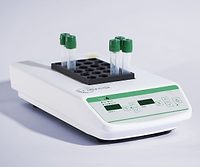3M Clean-Trace Hygiene Monitoring and Management System Achieves AOAC Performance Tested Method Certification

3M Food Safety's 3M™ Clean-Trace™ Hygiene Monitoring and Management System, a rapid and comprehensive method for testing food or beverage manufacturing surfaces, has received AOAC® Performance Tested Method (PTM) Certificate No. 041901 from the AOAC® Research Institute.
The 3M Clean-Trace System’s performance claim to detect adenosine triphosphate (ATP) on common food manufacturing contact surfaces with consistency and stability was evaluated through the AOAC PTM program.
The scope of this evaluation expanded beyond what has been evaluated for other ATP systems on the market today. It concluded that the 3M system is a reliable and rapid method for the detection of low levels of ATP, both as pure analyte and from food and microbial sources, on three different surfaces: stainless steel, ceramic, and plastic.
The study also evaluated the system’s robustness and determined the method was able to distinguish low and high levels of ATP when used over a range of activation times (2–15 seconds) and temperatures (10–35 °C) often experienced in use.
In addition, study results demonstrate that 3M’s technology detects ATP and provides actionable results in the presence of common sanitizers used in the food industry.
“When we designed the system, we wanted to create a tool that would work reliably and consistently in the real-world environments our customers operate in, not just in a lab setting,” says Burcu Yordem, Ph.D., 3M Food Safety senior technical service scientist. “This third-party PTM validation affirms the robustness of the 3M technology in verifying the cleanliness and sanitation of a wide range of customer facilities and environmental conditions."
A full report on the research used for the certification will be published in the Journal of AOAC International within the next year.
The 3M Clean-Trace System can help bridge the gap between an immediate but imperfect visual inspection and the time-consuming process of microbial culturing of collected samples. It takes only seconds to test for the presence of ATP, a molecular indicator of biological residue. ATP testing and its benefits have been well-supported for many years throughout scientific literature, but not all systems perform equally. To make an informed choice that best meets their needs, manufacturers are encouraged to evaluate ATP solutions in their individual production environments prior to adoption.
3M Food Safety | 3M.com
Looking for a reprint of this article?
From high-res PDFs to custom plaques, order your copy today!




